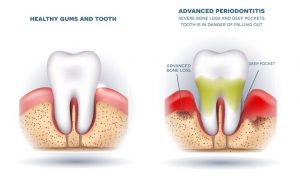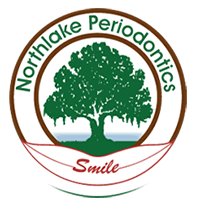PREVENTING GUM DISEASE
 Adults, over the age of 35, lose more teeth to gum disease than from cavities. At least three out of four adults are affected at some time in their life. The best way to prevent cavities and periodontal disease is by twice daily thorough tooth brushing and flossing techniques along with regular professional examinations and cleanings. Unfortunately, even with the most diligent home dental care, people can still develop some form of periodontal disease. Once this disease starts, professional intervention is necessary to prevent its progression. Once you have periodontal disease, you always have periodontal disease, however, it can be controlled via proper oral hygiene and having the teeth professionally cleaned every three months along with any necessary surgical periodontal treatment.
Adults, over the age of 35, lose more teeth to gum disease than from cavities. At least three out of four adults are affected at some time in their life. The best way to prevent cavities and periodontal disease is by twice daily thorough tooth brushing and flossing techniques along with regular professional examinations and cleanings. Unfortunately, even with the most diligent home dental care, people can still develop some form of periodontal disease. Once this disease starts, professional intervention is necessary to prevent its progression. Once you have periodontal disease, you always have periodontal disease, however, it can be controlled via proper oral hygiene and having the teeth professionally cleaned every three months along with any necessary surgical periodontal treatment.
Other important factors that can negatively affect the health of your gums include: tobacco usage, stress, clenching and grinding teeth, some medications and poor nutrition.
Periodontal Disease & Tobacco
You are probably familiar with the links between tobacco use and lung disease, cancer and heart disease. You may not realize, studies have shown that tobacco use is one of the most significant risk factors for developing periodontal disease. Whether you smoke, dip or chew tobacco, you are more likely to have periodontal disease – and to have it more severely – than those who do not use any form of tobacco. Cases of periodontal disease are more severe in smokers and tobacco users. There is a greater incidence of calculus formation on teeth, deeper pockets between gums and teeth as well as greater loss of the bone and fibers that hold teeth in your mouth. In addition, the chance of developing oral cancer is much higher, with the use of smokeless tobacco. Bad breath, stained teeth, tooth loss, bone loss, loss of taste and smell, gum recession and mouth sores as well as less success with periodontal treatment and/or dental implants are all problems which occur more often in patients who use any form of tobacco.
Why Quitting Makes Sense
Tobacco use is addictive, yet every year millions of Americans quit. The benefits include reduced chance of developing cancer, lung disease and heart disease as well as less expensive health care. When you quit using tobacco, you also reduce your chances of getting oral and gum diseases. Gums that are free of disease are essential to help you keep your teeth for a lifetime.
Quitting takes commitment – and it’s usually easier if you have help. To begin a tobacco cessatin program, talk to us and/or your physician. They are prepared to help.
 Adults, over the age of 35, lose more teeth to gum disease than from cavities. At least three out of four adults are affected at some time in their life. The best way to prevent cavities and periodontal disease is by twice daily thorough tooth brushing and flossing techniques along with regular professional examinations and cleanings. Unfortunately, even with the most diligent home dental care, people can still develop some form of periodontal disease. Once this disease starts, professional intervention is necessary to prevent its progression. Once you have periodontal disease, you always have periodontal disease, however, it can be controlled via proper oral hygiene and having the teeth professionally cleaned every three months along with any necessary surgical periodontal treatment.
Adults, over the age of 35, lose more teeth to gum disease than from cavities. At least three out of four adults are affected at some time in their life. The best way to prevent cavities and periodontal disease is by twice daily thorough tooth brushing and flossing techniques along with regular professional examinations and cleanings. Unfortunately, even with the most diligent home dental care, people can still develop some form of periodontal disease. Once this disease starts, professional intervention is necessary to prevent its progression. Once you have periodontal disease, you always have periodontal disease, however, it can be controlled via proper oral hygiene and having the teeth professionally cleaned every three months along with any necessary surgical periodontal treatment.
Other important factors that can negatively affect the health of your gums include: tobacco usage, stress, clenching and grinding teeth, some medications and poor nutrition.
Periodontal Disease & Tobacco
You are probably familiar with the links between tobacco use and lung disease, cancer and heart disease. You may not realize, studies have shown that tobacco use is one of the most significant risk factors for developing periodontal disease. Whether you smoke, dip or chew tobacco, you are more likely to have periodontal disease – and to have it more severely – than those who do not use any form of tobacco. Cases of periodontal disease are more severe in smokers and tobacco users. There is a greater incidence of calculus formation on teeth, deeper pockets between gums and teeth as well as greater loss of the bone and fibers that hold teeth in your mouth. In addition, the chance of developing oral cancer is much higher, with the use of smokeless tobacco. Bad breath, stained teeth, tooth loss, bone loss, loss of taste and smell, gum recession and mouth sores as well as less success with periodontal treatment and/or dental implants are all problems which occur more often in patients who use any form of tobacco.
Why Quitting Makes Sense
Tobacco use is addictive, yet every year millions of Americans quit. The benefits include reduced chance of developing cancer, lung disease and heart disease as well as less expensive health care. When you quit using tobacco, you also reduce your chances of getting oral and gum diseases. Gums that are free of disease are essential to help you keep your teeth for a lifetime.
Quitting takes commitment – and it’s usually easier if you have help. To begin a tobacco cessatin program, talk to us and/or your physician. They are prepared to help.
